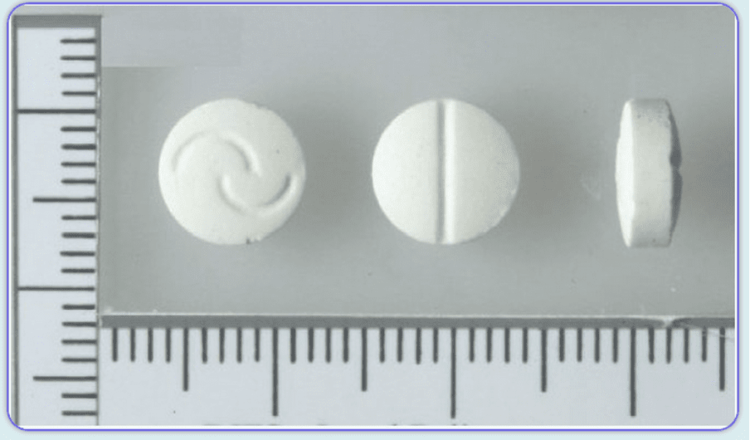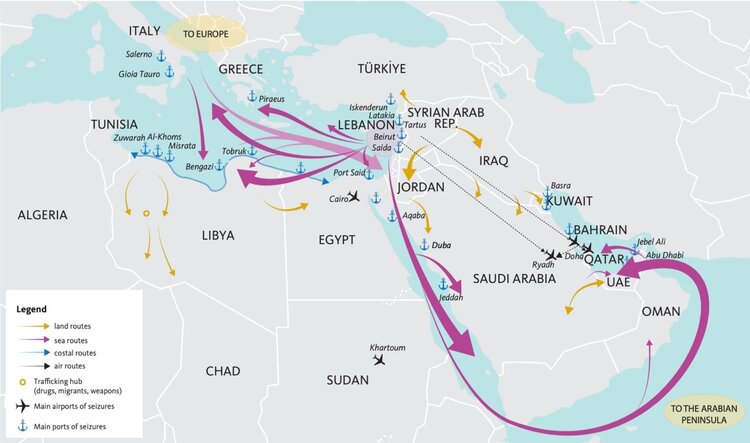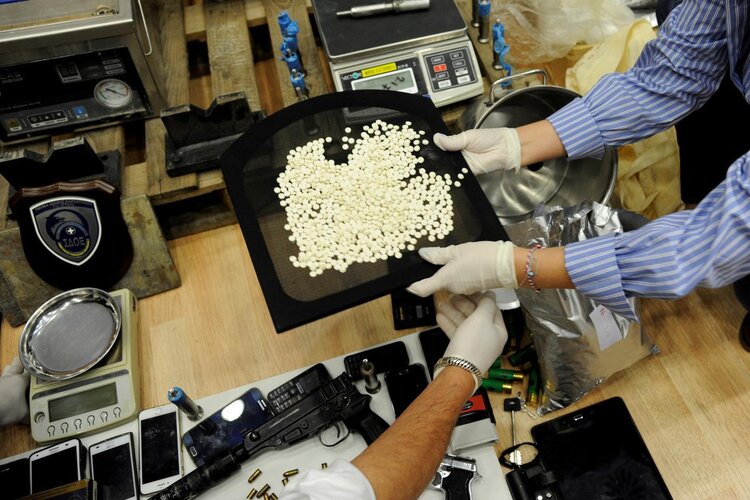Narco-Syria: How the Captagon economy flourished amidst the ruins of war
'The Jihadist pills', serving as psychostimulants for soldiers, have become the Assad regime's most crucial source of income
Psychostimulant Captagon has taken over the Middle East, particularly Saudi Arabia. It is produced by pharmaceutical factories in Syria, which generate billions of dollars for the Assad regime and give them leverage in negotiations for the normalisation of relations with Arab states.
What is Captagon?
Captagon is a small white pill marked with two letters C. It contains two psychoactive substances (amphetamine and theophylline) that trigger the brain's secretion of norepinephrine, activating the 'fight or flight' response, as well as dopamine and serotonin – hormones associated with joy and pleasure.
Within minutes of ingesting a Captagon pill, a person experiences a surge of energy and self-assurance. This effect lasts for several hours.

While immediate side effects may not occur after drug use, abusing Captagon leads to deep depression, anxiety, fatigue, insomnia, rapid heartbeat, and, in isolated cases, blindness, deafness, or heart attacks.
How Syria became the 'patient zero' infecting the Middle East
According to The Guardian, in 2013, Captagon fuelled the civil war in Syria. The white pills with two letters C gained a notorious reputation as the 'jihadist pills' after reports emerged that Kurdish fighters found them on killed ISIS militants. Later, it was revealed that soldiers from Bashar al-Assad's army and pro-Western opposition groups also extensively used Captagon to gain alertness, determination, and fearlessness.
"The holy grail that armies around the world have been looking for is a drug that gives people courage, and Captagon comes close," says Dr. Raj Persaud, a fellow at the London-based Royal College of Psychiatrists. "It doesn't give you distilled courage, but it gives you a tendency to want to keep going and impaired judgement, so you don't consider whether you're scared or not. You feel euphoria. You don't feel pain."
In the early 2010s, Captagon was exported to Syria's warring factions from neighbouring Lebanon. However, by 2015, the industrially developed region of Syria under Bashar al-Assad's control repurposed its own pharmaceutical factories to produce the military drug, displacing Lebanese production onto its territory.
"Syria provides an optimal logistical environment for transnational organised drug production," describedthe Journal of International Affairs at Columbia University in 2016, referring to Syria's evolution into a narco-state. "Syria is a weakened state that has long-standing smuggling routes for illicit goods, in addition to the multitude of other products being shipped into and out of the nation on a daily basis. The armed forces of the state are largely occupied with fighting the insurgency and have abandoned their posts along the border, placing all of the responsibility for enforcing anti-smuggling measures on neighbouring border forces. All that is needed is for protection to be provided by an armed faction, ensuring these logistics run smoothly."
The government of Bashar al-Assad has always denied its involvement in transforming Syria into the global capital of Captagon, accusing the rebels of drug trafficking. However, after pushing the rebels into the northwestern corner of the country, Western experts had no doubt that the ruling regime controlled a multi-billion-dollar drugs industry, using it as a cash cow and bargaining chip in international negotiations..

Why did the 'military drug' gain popularity in the Middle East?
The phenomenon of the explosive spread of Captagon in Arab countries is partly explained by its low cost. In Syria, one dose costs $0.5, on the streets of Jordan – $2.5, and in nightclubs in Saudi Arabia – from $10 to $25.
Under the brand name "Captagon", mixtures of amphetamine with heroin or Viagra are also sold, which do not have the 'fight or flight' effect and are cheaper. Varieties of white pills with two letters C are promoted on the black market as weight loss aids, as 'cocaine for the poor', and as an affordable alternative to alcohol, which is prohibited in Saudi Arabia. Smuggled whiskey there costs about $800 per bottle.
According to a study by the Arab Center Washington DC (ASW), the demand for Captagon is increasing due to high unemployment among the youth, which stands at 29% in wealthy Saudi Arabia and 50% in impoverished Jordan. Many young Saudis and Jordanians consider their lives to be unpromising and boring, thus using these white pills to dispel gloomy thoughts, relax, and have fun.
Captagon Market Size
In 2022, law enforcement agencies of Middle Eastern countries seized over 370 million Captagon pills, weighing more than 60 tonnes. This is just the visible tip of the iceberg, as the majority of the market remains unnoticed or unaccounted for.
In a recent press release, the British government announced that 80% of Captagon is produced in Syria, and the volume of illegal trade of this commodity could reach $57 billion per year. It is three times more than the total revenue generated by all drug cartels in Mexico. Against the backdrop of this Captagon industry, the entire legal economy of Syria, with its $11 billion official GDP and $1 billion in exports, pales in comparison.

Political benefits for Syria
Analysts suggest that Bashar al-Assad wants to simulate a fight against drug trafficking in order to achieve the normalisation of relations with other Arab countries, obtain funds from them for post-war reconstruction, and bypass Western sanctions.
"Gulf Arab states won’t be able to directly inject cash into Assad’s government with the sanctions in place. However, they could funnel money through U.N.-led projects in government-held Syria to get action from Assad against Captagon," quotes the Associated Press Karim Shaara, a senior fellow at Washington-based New Lines Institute.
In May 2023, Syria was invited back to the Arab League, from which it was excluded in 2011 in response to the brutal suppression of protests by the Assad regime. According to the Associated Press, countering Captagon trade was the main demand of Arab countries in negotiations regarding the end of Syria's political isolation.
Bashar al-Assad clearly allowed the destruction of part of his narco-industry. With his permission, on May 8, 2023, Jordan carried out airstrikes in southern Syria, killing the notorious drug lord Merhi al-Ramthan along with his wife and six children, and also destroyed a Captagon factory near the city of Daraa. Experts consider this a political game in which Bashar al-Assad may sacrifice fragments of his Captagon economy in exchange for compensation from Arab countries.
If you have read this article to the end, we hope that means it was useful for you.
We work to ensure that our journalistic and analytical work is of high quality, and we strive to perform it as competently as possible. This also requires financial independence. Support us for only UAH 196 per month.
Become a Mind subscriber for just USD 5 per month and support the development of independent business journalism!
You can unsubscribe at any time in your LIQPAY account or by sending us an email: [email protected]



